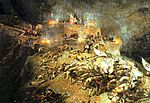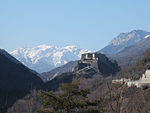Gran Bosco di Salbertrand Natural Park

The Gran Bosco di Salbertrand Natural Park (Italian: Parco naturale del Gran Bosco di Salbertrand) is a nature reserve in Piedmont, Italy. Established in 1980, it protects the Site of Community Importance of the Great Woods of Salbertrand (Gran Bosco di Salbertrand), in the Val Susa, south of the Dora Riparia, between 1,000 and 2,700 meters above sea level. The woods, which cover an area of about eight hundred acres, consist of a mix of silver firs and Norway spruces, rarely found in the Western Alps.About 70% of the park's territory consists of woods, the remaining 30% of pastures and grasslands. Since 2009 the park, which covers the territory of seven municipalities in the Province of Turin, has been managed by the Ente di gestione delle aree protette delle Alpi Cozie, along with the Val Troncea, Lakes of Avigliana and Orsiera-Rocciavrè natural parks and the natural reserves of the gorges of Foresto and Chianocco.The park's flora consists of over six hundred species of plants, including silver firs, larches, European spruces, stone pines and Scotch pines. The fauna consists of 21 species of mammals, including red deer, roe deer, chamoises, wild boars, marmots, foxes, squirrels, stoats and wolves, and 70 species of birds, including golden eagles, sparrowhawks, Eurasian goshawks, common buzzards, rock partridges and black grouses.
Excerpt from the Wikipedia article Gran Bosco di Salbertrand Natural Park (License: CC BY-SA 3.0, Authors, Images).Gran Bosco di Salbertrand Natural Park
Strada militare del Colle dell'Assietta,
Geographical coordinates (GPS) Address Nearby Places Show on map
Geographical coordinates (GPS)
| Latitude | Longitude |
|---|---|
| N 45.061111111111 ° | E 6.9402777777778 ° |
Address
Casa Assietta
Strada militare del Colle dell'Assietta
Piedmont, Italy
Open on Google Maps










